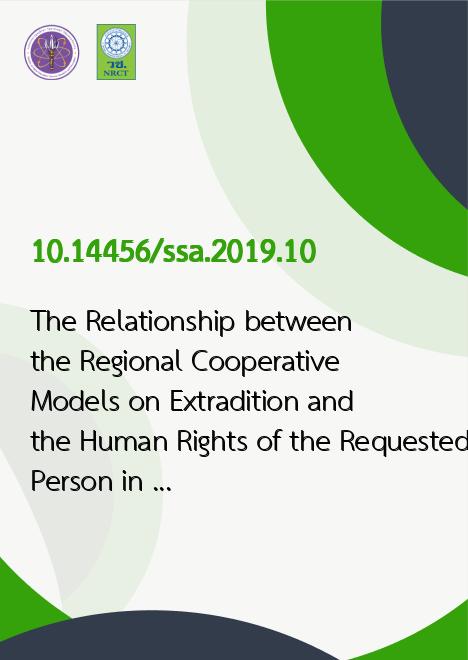
|
The Relationship between the Regional Cooperative Models on Extradition and the Human Rights of the Requested Person in Human Trafficking cases |
|---|---|
| รหัสดีโอไอ | |
| Creator | Mark Charoenwong |
| Title | The Relationship between the Regional Cooperative Models on Extradition and the Human Rights of the Requested Person in Human Trafficking cases |
| Publisher | National Research Council of Thailand |
| Publication Year | 2562 |
| Journal Title | SOCIAL SCIENCE ASIA : Official Journal of National Research Council of Thailand in conjunction with Journal of Thai Justice System |
| Journal Vol. | 5 |
| Journal No. | 2 |
| Page no. | 13-32 |
| Keyword | Extradition Process, EAW, Intergovernmental Model, Human Rights and Requested Person |
| URL Website | http://e-journal.nrct.go.th/ |
| Website title | e-journal |
| ISSN | 2229-2608 |
| Abstract | Even though sixty per cent of human trafficking cases around the globe occur in the ASEAN region, extradition requests are almost never made by the Member States, apart from in the case of Rohingya.In contrast, the number of surrendered persons within the EU is proliferating as a result of the transformative process of extradition from the intergovernmental to the supranational-type approach to extradition. However, since the adoption of the European Arrest Warrant (EAW), subsequent literature has assumed that the supranational-type approach of the EAW negatively impacts upon the human rights of the requested persons. This article will examine the relationship between regional cooperative structures on extradition based on Supranational and Intergovernmental models of the EU and the ASEAN respectively, in particular, the issue of human rights protection. It is argued that the relationship between the theoretical bases of regional cooperative structures and the impact upon human rights of the requested persons has never been critically examined. Therefore, the main question of this research is whether the possible impact on the human rights of the requested person is a direct consequence of regional cooperative models. In fact, both intergovernmental and supranational-type approaches have advantages and disadvantages in protecting the requested person's human rights. With respect to the ASEAN context, the model of extradition process is not the crucial factor because law enforcement practitioners implement a more expedient process a deportation system in place of extradition, even though they know that it would erode the human rights of the requested person. In addition, under the supranational laws/institutions of the EU the Charter of Fundamental Rights of the European Union, theEuropean Court of Human Rights and the Court of Justice of the European Union the requested person's human rights have been better protected than under the intergovernmental cooperative structure of the ASEAN. This is because the supranational legal instruments of the EU have been established for the implementation of legal mechanisms to protect human rights which are still lacking in the ASEAN. |